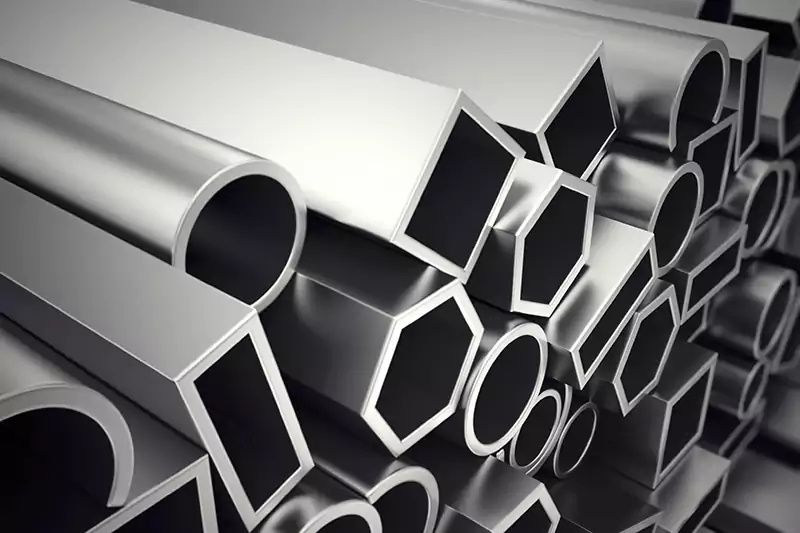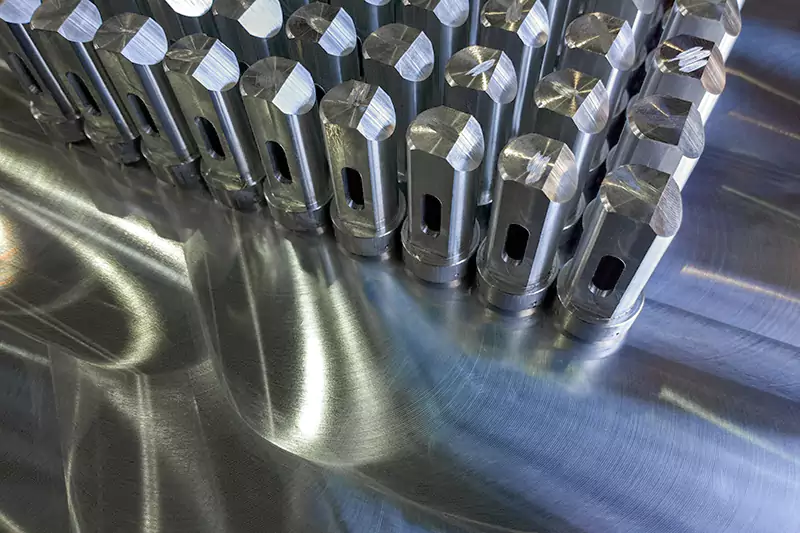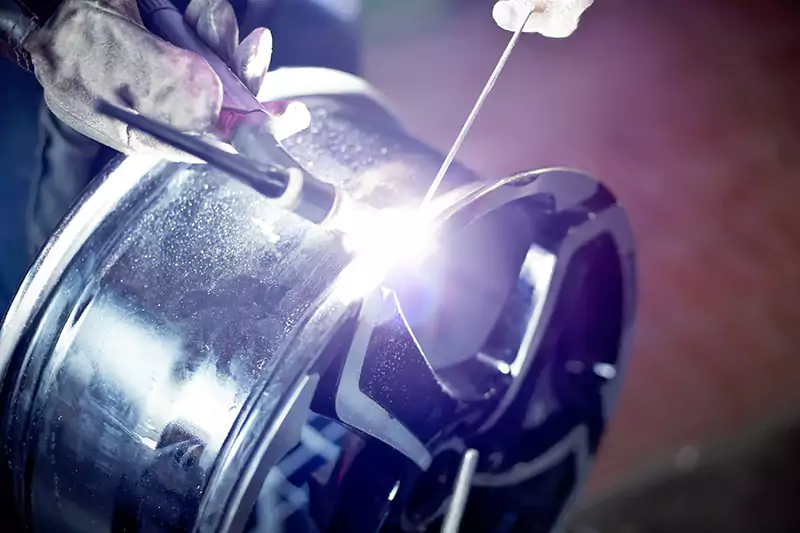Aluminum 6061 vs 7075?
Aluminum is a popular material in the manufacturing industry due to its lightweight and corrosion-resistant properties. There are many different aluminum alloys available, each with its own unique properties and applications. In the process of selecting an appropriate aluminum alloy for a project, it is crucial to carefully assess the desired attributes needed for the final application. Within the industry, two commonly utilized aluminum alloys are 7075 and 6061. It is worth comparing these two types to determine which will best suit the specific project requirements.

Aluminum 6061
Aluminum 6061 is a popular and versatile alloy of aluminum that is commonly used in a wide range of applications, from automotive parts to construction materials. It is composed primarily of aluminum, with small amounts of silicon, iron, copper, manganese, magnesium, chromium, and zinc.
One of the key properties of 6061 aluminum is its excellent strength-to-weight ratio, which makes it a popular choice for structural applications where weight is a critical factor. It also has good corrosion resistance, which makes it suitable for outdoor and marine applications.
6061 aluminum can be easily machined, welded, and formed into various shapes and sizes, and it can also be heat-treated to improve its strength and hardness. It is available in a variety of forms, including sheets, plates, bars, and extrusions.
This alloy is commonly used in the production of aerospace components, marine fittings, bicycles, automotive parts, and construction materials such as window frames, roofing panels, and stair treads. It is also used in the manufacturing of consumer goods, such as sporting equipment and furniture.
Chemical composition
The chemical composition of Aluminum 6061 typically includes:
Aluminum (Al): 97.9%
Silicon (Si): 0.6%
Magnesium (Mg): 1.0%
Iron (Fe): 0.7%
Copper (Cu): 0.28%
Manganese (Mn): 0.6%
Chromium (Cr): 0.23%
Zinc (Zn): 0.2%
Titanium (Ti): 0.15%
Other elements: 0.15%
These percentages can vary slightly depending on the specific manufacturing process and the intended application of the alloy. The primary alloying elements in 6061 aluminum are magnesium and silicon, which give it its strength, formability, and corrosion resistance. The other elements present in small amounts contribute to its overall properties and may be adjusted to meet specific requirements for a particular application.
Mechanical properties
Aluminum 6061 has good mechanical properties, making it suitable for a wide range of applications. Its mechanical properties are as follows:
Tensile strength: 45,000 psi (310 MPa)
Yield strength: 40,000 psi (276 MPa)
Elongation: 12%
Modulus of elasticity: 10,000 ksi (68.9 GPa)
Hardness: 95 Brinell
Heat treatment
Aluminum 6061 can also be heat treated to improve its mechanical properties. It can be solution heat treated at 530°C (985°F) for several hours, followed by quenching in water, to improve its strength. It can also be aged at room temperature or at 177°C (350°F) for several hours to further improve its mechanical properties.
Applications
Structural components
Aluminum 6061 is commonly used in structural components due to its high strength and excellent corrosion resistance. It is often used for frames, chassis, and other structural components in the automotive, and construction industries.

Marine applications
Aluminum 6061 is widely used in marine applications due to its excellent corrosion resistance. It is commonly used for boat fittings, propellers, and other marine components.
Electrical and electronic equipment
Aluminum 6061 is used in electrical and electronic equipment due to its good ability to dissipate heat. It is commonly used for heat sinks, electrical enclosures, and other components.
Bicycle frames
Aluminum 6061 is commonly used for bicycle frames due to its high strength and lightweight. It is often used in mountain, road, and other high-performance bicycles.
Automotive parts
Aluminum 6061 is used in the automotive industry for various components, including wheels, suspension parts, and engine blocks.
Aluminum 7075
Aluminum 7075 is a high-strength alloy of aluminum that is commonly used in aerospace and defense applications due to its excellent strength-to-weight ratio and resistance to fatigue. It contains zinc as the primary alloying element, as well as small amounts of magnesium, copper, and chromium.
7075 aluminum has a very high tensile strength and yield strength, making it suitable for use in high-stress structural applications. It is also highly resistant to corrosion, which makes it ideal for use in harsh environments.
Aluminum 7075 is commonly used in aircraft structural components, such as wing spars, fuselage frames, and bulkheads. It is also used in high-performance bicycles, automotive parts, and other applications where strength, lightweight, and durability are important factors.
Chemical composition
The chemical composition of Aluminum 7075 typically includes:
Aluminum (Al): 87.1%
Zinc (Zn): 5.6%
Magnesium (Mg): 2.5%
Copper (Cu): 1.6%
Chromium (Cr): 0.23%
Silicon (Si): 0.16%
Iron (Fe): 0.15%
Manganese (Mn): 0.05%
Titanium (Ti): 0.04%
Other elements: 0.15%
These percentages can vary slightly depending on the specific manufacturing process and the intended application of the alloy. The primary alloying elements in 7075 aluminum are zinc and magnesium, which give it its high strength and hardness. The copper content also contributes to its strength and improves its resistance to corrosion.
Mechanical properties
Aluminum 7075 has excellent mechanical properties, making it suitable for high-stress applications. Its mechanical properties are as follows:
Tensile strength: 83,000 psi (570 MPa)
Yield strength: 73,000 psi (503 MPa)
Elongation: 11%
Modulus of elasticity: 10,200 ksi (70.3 GPa)
Hardness: 150 Brinell
Heat treatment

Aluminum 7075 can be heat treated to improve its mechanical properties. It can be solution heat treated at 477°C (890°F) for several hours, followed by quenching in water, to improve its strength. It can also be aged at room temperature or at 120°C (250°F) for several hours to further improve its mechanical properties.
Applications
Aerospace components
Aluminum 7075 is a popular material for aerospace components due to its high strength and stiffness. It is commonly used in aircraft wings, fuselage frames, landing gears, and other structural components.
Automotive parts
Aluminum 7075 is also used in the automotive industry for high-performance applications. It is commonly used for suspension components, drive shafts, wheels, and other high-stress parts.
Marine applications
Aluminum is used in marine applications due to its excellent corrosion resistance and strength. It is commonly used for boat fittings, masts, and other marine components.
Sporting equipment
Aluminum 7075 is used in various sporting equipment due to its high strength-to-weight ratio. It is commonly used for bicycle frames, baseball bats, hockey sticks, and other equipment that require high stiffness and strength.
Tooling
Aluminum 7075 is used in tooling applications where high strength and stiffness are required. It is commonly used for molds, dies, and other tooling applications in the manufacturing industry.
6061 vs 7075
Now that we have introduced both 7075 and aluminum 6061, let’s compare the two alloys in terms of their mechanical properties, chemical composition, heat treatment, yield strength, and weight ratio.
Mechanical properties
Aluminum has a higher tensile strength and yield strength than aluminum 6061. It also has a higher modulus of elasticity, which means it is more rigid and less likely to deform under stress. However, aluminum 6061 has a higher elongation, which means it is more ductile and can stretch further before breaking.
Chemical composition
Aluminum 7075 contains more zinc, magnesium, and copper than aluminum 6061. This gives it a higher strength-to-weight ratio but also makes it more difficult to weld and form. Aluminum 6061 contains more silicon, which gives it better corrosion resistance and makes it easier to weld and form.
Heat treatment
Both aluminum 7075 and aluminum 6061 can be heat treated to improve their mechanical properties. However, the heat treatment process for aluminum 7075 is more complicated and requires more precise control of temperature and cooling rates. This makes it more expensive and time-consuming to heat treat aluminum 7075 compared to aluminum 6061.
Yield strength
Yield strength is an important mechanical property that determines how much stress a material can withstand before it starts to deform permanently. Aluminum 7075 has a higher yield strength than aluminum 6061, which means it can withstand higher stress without deforming permanently. This makes it more suitable for high-stress applications, such as aerospace components and racing cars.
Weight ratio
Both aluminum 7075 and aluminum 6061 have a high strength-to-weight ratio, which is one of the main reasons why aluminum is such a popular material in the manufacturing industry. However, aluminum 7075 has a higher density than aluminum 6061, which means it is slightly heavier for the same volume of material. This can be a disadvantage in some applications where weight is critical, such as in the aerospace industry.
Conclusion
Aluminum 7075 and aluminum 6061 are both popular aluminum alloys with unique properties and applications. Aluminum 7075 is a high-strength aluminum alloy that is commonly used in high-stress applications, such as aerospace components and racing cars. Aluminum 6061 is a versatile aluminum alloy that is commonly used in a wide range of applications, such as automotive parts, construction, and sports equipment.
Both alloys can be heat treated to improve their mechanical properties, but the heat treatment process for aluminum is more complicated and requires more precise control of temperature and cooling rates. Aluminum 7075 has a higher yield strength and modulus of elasticity than aluminum 6061, but aluminum 6061 has a higher elongation and better corrosion resistance.
Ultimately, CapableMaching thinks the choice between aluminum 7075 and aluminum 6061 will depend on the specific application and requirements of the project. It is important to consider factors such as strength, ductility, corrosion resistance, weight, and cost when selecting an aluminum alloy for a particular application.
Remarkable! Its actually remarkable article, I have got much clear
idea regarding from this article.
hey there and thank you for your information – I’ve definitely picked up something new from right here. I did however expertise some technical points using this site, as I experienced to reload the web site many times previous to I could get it to load orrectly. I had been wondering if your hosting is OK? Not that I’m complaining, but slow loading instances times will sometimes affect your placement in google and could damage your high-quality score if ads and marketing with Adwords. Anyway I’m adding this RSS to my e-mail and could look out for much more of your respective exciting content. Make sure you update this again soon.
Awesome site you have here but I was wondering if you knew of any community forums that cover the same topics discussed here? I’d really like to be a part of community where I can get responses from other experienced individuals that share the same interest.
If you have any suggestions, please let me know. Appreciate it!
Thanks for your attention, There are currently no plans to build a community.
Very nice post. I simply stumbled upon your weblog and wished to mention that I’ve really loved surfing around your weblog posts. In any case I will be subscribing on your feed and I’m hoping you write once more soon!
Thanks for your message, I will try my best.
I do accept as true with all of the ideas you’ve presented to your post. They’re very convincing and will certainly work. Nonetheless, the posts are too quick for starters. May just you please extend them a little from subsequent time? Thanks for the post.
Pretty component to content. I just stumbled upon your website and in accession capital to claim that I acquire in fact loved account your weblog posts. Any way I’ll be subscribing for your augment and even I success you get right of entry to consistently fast.
I used to be recommended this website through my cousin. I’m now not sure whether or not this publish is written via him as no one else know such special approximately my difficulty. You’re incredible! Thanks!